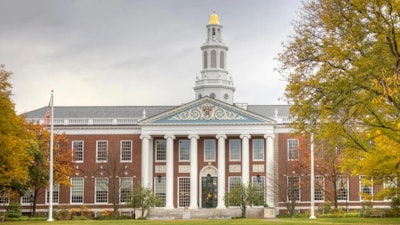 Harvard University
Harvard University
The Department of Homeland Security terminated Harvard's Student and Exchange Visitor Program certification after the university refused to provide conduct records of international students requested by DHS last month. The action affects Harvard's substantial international community of 9,970 people, including 6,793 international students who represent 27.2% of total enrollment for the 2024-25 academic year.
"Harvard can no longer enroll foreign students and existing foreign students must transfer or lose their legal status," DHS stated, marking the most aggressive federal intervention in university enrollment policies in recent memory.
The move represents a seismic shift in federal higher education policy that could reshape the landscape of American academia, where international students have long been integral to research innovation, cultural exchange, and institutional prestige. Harvard's international student body hails from more than 140 countries, contributing perspectives and expertise that faculty say are irreplaceable.
The Harvard action signals an escalating federal campaign against what the administration characterizes as problematic diversity, equity and inclusion practices at elite universities. In her letter to Harvard, Homeland Security Secretary Kristi Noem accused the institution of employing "racist 'diversity, equity and inclusion' practices" and creating an environment "hostile to Jewish students."
The targeting of international student enrollment represents a new frontier in debates over campus diversity. Unlike domestic diversity initiatives that focus on race, ethnicity, and socioeconomic status, international student recruitment has traditionally enjoyed bipartisan support as both an economic driver and diplomatic tool.
Faculty members express particular concern about the impact on research programs that rely heavily on international graduate students and postdoctoral researchers. One professor familiar with the situation warned that "many labs will empty out" if the policy takes effect, potentially crippling research initiatives that depend on global talent pipelines.
The concentration of international students in STEM fields means the policy could disproportionately affect scientific research and innovation—areas where American universities have long maintained global leadership through diverse, international collaborations.
Harvard's response emphasized the university's commitment to its international community and the broader principles of academic freedom.
"This retaliatory action threatens serious harm to the Harvard community and our country, and undermines Harvard's academic and research mission," said university spokesperson Jason Newton.
The administration's action against Harvard appears designed to send a message to universities nationwide about federal expectations regarding campus policies and student demographics. The DHS statement explicitly warned other institutions: "Let this serve as a warning to all universities and academic institutions across the country."
This represents a fundamental shift in the relationship between federal agencies and higher education institutions, moving beyond traditional oversight mechanisms to direct intervention in enrollment decisions—an area historically considered within institutional autonomy.
The White House defended the action by framing international student enrollment as conditional privilege rather than established practice. "Enrolling foreign students is a privilege, not a right," said White House spokesperson Abigail Jackson, who characterized Harvard as having "turned their once-great institution into a hot-bed of anti-American, anti-Semitic, pro-terrorist agitators."
The Harvard case may serve as a test for how far federal agencies can go in reshaping university policies through regulatory enforcement. The precedent could affect not only international student recruitment but also broader questions about institutional autonomy, academic freedom, and the role of diversity in higher education.
For the broader higher education community, the action raises critical questions about the future of international education partnerships and America's position as a global destination for academic talent. Universities have increasingly relied on international students not only for their academic contributions but also as a revenue source, particularly as state funding for public institutions has declined.
The controversy also highlights ongoing tensions over how universities should balance diverse perspectives with concerns about campus climate and safety. As institutions navigate these competing demands, the Harvard case may provide a roadmap—or cautionary tale—for how federal policy can reshape the fundamental character of American higher education.
Harvard has indicated it will challenge the action legally, setting up a potential court battle that could determine the extent of federal authority over university enrollment policies and the future of international education in America.
















